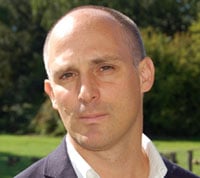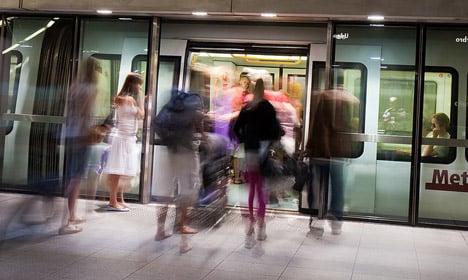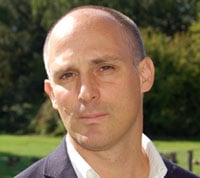 Michael Booth is the author of The Almost Nearly Perfect People: The Truth About the Nordic Miracle available now on Amazon and is a regular contributor to publications including the Guardian and Monocle
Michael Booth is the author of The Almost Nearly Perfect People: The Truth About the Nordic Miracle available now on Amazon and is a regular contributor to publications including the Guardian and Monocle
BOOTH
The pick-pocket problem in ‘perfect’ Copenhagen
Columnist Michael Booth is currently promoting his book to the North American market, telling everyone who'll listen about how 'almost nearly perfect' Denmark is. But a funny thing happened on the way to one of those media interviews.
Published: 10 February 2015 19:42 CET

The hustle and bustle of Nørreport makes it "a kind of pick-pocket amusement park, with no entry fee and free rides for all". Photo: Stig Nygaard/Flickr
Last Thursday I caught a train from Nørreport Station. As an upstanding member of a high trust society, rather than take advantage of the lack of barriers on Copenhagen’s Metro system and ride for free (perish the thought), I bought a ticket at the machine. I used my Dankort.
Ticket in hand, I put my wallet back into the outside pocket of my bag, zipped it shut, slung the bag over my shoulder and hurried down the escalators. My train was already at the platform, so I did what in my world passes for ‘running’ down the last half of the second escalator (a kind of huffy-breathed, galumphing stagger, taking advantage of gravity’s pull), making the train just as the doors closed.
Once in, I squeezed up into a corner of the carriage, and drifted off into my usual brain-dead commuting head-space.
Just past Kongens Nytorv Station, some primal instinct made me check my bag just to make sure I hadn’t been pick-pocketed, or somesuch.
The zipper of the outer pocket was wide open.
My wallet was gone.
I was still doing a kind of tragic Macarena, patting down pockets, twisting to check the rest of my bag, as the train pulled into my destination, DR Byen, where I was heading to a studio to give an interview to Canadian national radio about how wonderful Denmark is.
But the wallet was still gone.
I did what I usually do in times of emergency and stress: I called my wife. She promised to call the bank and cancel my card while I was in the studio. Aside from that, I’d lost a bit of cash – 500 kroner – my driver’s licence, CPR card, and a photograph of the former president of the Philippines, Joseph Estrada, which I always carry around in my wallet. Horrid, but could have been worse.
Half an hour later, having finished my interview, I left the studio and turned on my phone. It rang almost immediately. It was my wife. Apparently, in the time it had taken me to travel three stops on the Metro and conclude my Macarena, the robber and/or robbers had cleared out my bank account, and then some. They had taken tens of thousands of kroner.
Bu…how..wha…?
Piecing events together, it seems the thief had managed to see my pin code when I bought my ticket and, in the time between me putting my wallet in my bag, and beginning to ‘run’ halfway down the escalator, had parted me from it.
It could have been worse: the thieves didn’t harm me, in fact it was like being robbed by a ghost. Part of me almost admired their skill (although the other part would like to tie them up and place a cage filled with hungry ferrets over their head). Others I have spoken to since have told me tales of being barged into or tripped by the pickpockets that infest Copenhagen’s city centre. I will probably get most of my money back. I was able to replace my cards pretty simply online (although the Estrada pic is now lost forever). They didn’t take my phone either, which would have been terrible. So there’s all that.
But then I started to think about the police presence in Copenhagen. There is none, as far as I can see, not even outside the office of Jyllands-Posten on the City Hall Square, which you would imagine is a prime target for Islamic extremists (there is a police car, but it is always empty whenever I pass by, which is several times a week). Yet when I reported the theft to the cops, they reacted as if I had rung to inform them that Wednesday follows Tuesday. Nørreport especially seems to be a kind of pick-pocket amusement park, with no entry fee and free rides for all. Everyone knows this, so why aren’t there a couple of cops stationed there round the clock?
"We’d like to, but we don’t have the man power," I was told when I reported the incident.
That evening, a friend of mine posted a photo on Twitter of a police motorcycle blocking a cycle lane: the cop was busy ticketing cyclists for various misdemeanours. For this, they have the manpower. They do this because the government’s budget relies on the revenue from fines issued to cyclists and motorists. Indeed, Helle Thorning-Schmidt’s government recently raised the targets to balance the budget.
So here’s my solution. Clearly, Denmark’s tax rates are not nearly high enough to ensure decent levels of policing and protection of property so I propose that Copenhagen police position one of their number at Nørreport Station with a big collecting bucket. Everyone who enters the station is invited to donate one kroner to cover the cost of their wage. I’d happily pay that to make sure I wasn’t stolen from again. Although, of course, they should probably watch the bucket doesn’t get pinched…
Url copied to clipboard!


 Michael Booth is the author of The Almost Nearly Perfect People: The Truth About the Nordic Miracle available now on
Michael Booth is the author of The Almost Nearly Perfect People: The Truth About the Nordic Miracle available now on  Please whitelist us to continue reading.
Please whitelist us to continue reading.
Member comments